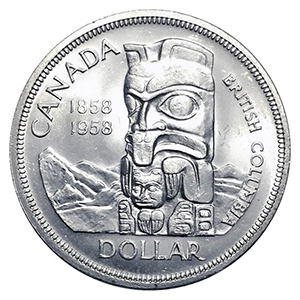
History-Periods
Past eras

From pre-history to today
Choose your period

Pre history - Present
explore the different eras

The colony of British Columbia was established on August 2, 1858 by James Douglas, who was appointed as the Governor of the colony by the Hudson's Bay Company. The colony was established to assert British control over the region and to compete with the expansion of the United States into the Pacific Northwest.
The centennial of this event was celebrated in 1958, marking 100 years since the founding of the colony of British Columbia. This celebration was marked by a number of events and activities, including parades, fairs, and the issuance of commemorative stamps and coins. The 1958 centennial was an important moment in the history of the province, as it helped to shape the provincial identity and marked a significant milestone in British Columbia's development as a distinct entity within Canada.
The establishment of the colony of British Columbia in 1858 was an important moment in the history of the region, as it marked the beginning of British control over the area and the establishment of a formal political and administrative presence in the region. The colony was established to assert British control over the region and to compete with the expansion of the United States into the Pacific Northwest.
The colony also played an important role in the development of the region's economy, as it helped to spur the growth of industries such as fur trading, fishing, and logging. The colony also helped to spur the growth of towns and cities, such as Victoria, which became the capital of the colony and is now the capital of the province.
Additionally, the colony helped to shape the cultural identity of British Columbia, as it brought together people of different backgrounds and cultures, including Indigenous peoples, European settlers, and immigrants from other parts of the world.
In general, the establishment of the colony of British Columbia in 1858 was an important event that helped to shape the political, economic, and cultural development of the region, and set the foundation for the growth and development of the province that we know today.
Some of the celebrations that took place for the 1958 centennial of the colony of British Columbia included:
Timeline
The impact of the 1958 centennial celebration of the colony of British Columbia on the citizens was significant. The celebration helped to shape the provincial identity and create a sense of pride among the citizens. Many people from all over the province participated in the celebration, which brought people together and allowed them to learn about their shared history and culture.
Additionally, the celebration helped to promote British Columbia as a tourist destination, and many people from other parts of Canada and around the world came to visit the province during the centennial year. The celebration also helped to spur economic development and investment, as well as the growth of the province's infrastructure, such as highways and airports.
In general, the 1958 centennial celebration helped to bring the citizens of British Columbia together and helped to promote a sense of unity and pride in the province. It was a big milestone in the history of the province, and it helped to shape the cultural identity of British Columbia.
British Columbiahistory.ca is a visitor supported web site. If you would like to submit an article or opinion, please visit our blog at www.blog.British Columbiahistory.ca.
Reference: Article by (Staff Historian), 2023
Tel: 1 604 833-9488
Email: info@canadahistorysociety.ca

All content and images are protected by copyright to Access History